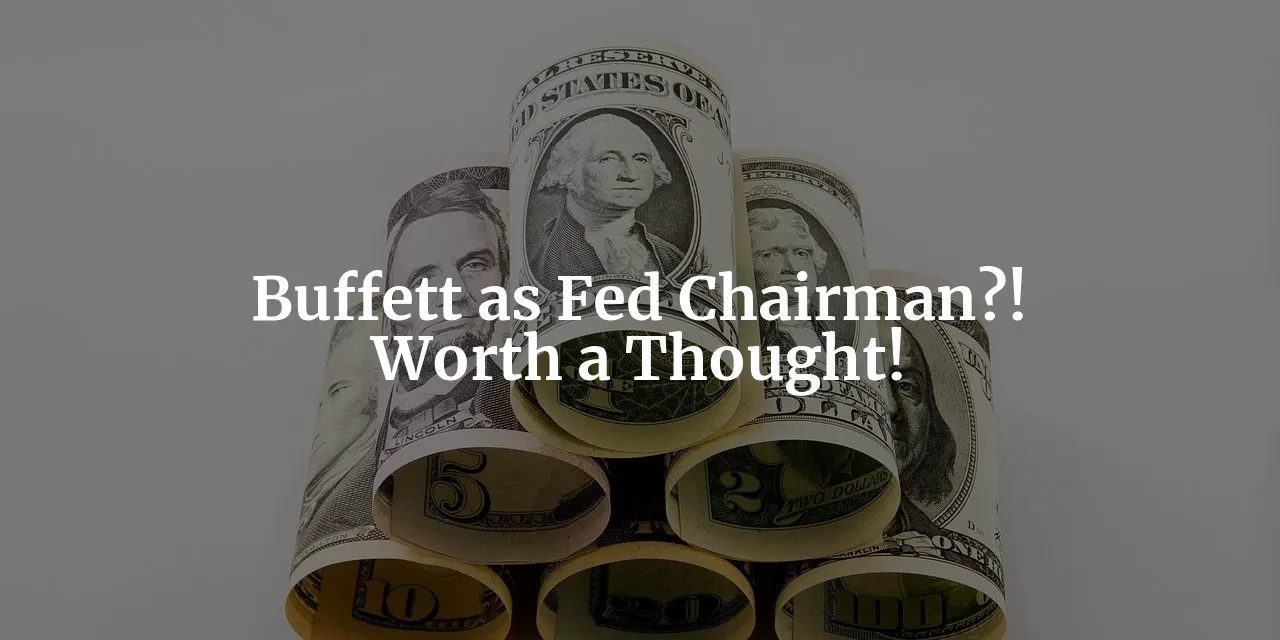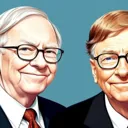Tags: Comments / Warren Buffett
This fanpage is not officially affiliated with Berkshire Hathaway: Disclaimer
Let us be creative about a scenario some may have dreamt of: Warren Buffett's hypothetical chairmanship at the Federal Reserve. We discuss how his tenure could revolutionize financial policies, reshape global economic landscapes, and enhance public trust in the institution.

Introduction
The Federal Reserve, established in 1913, stands as the cornerstone of the U.S. financial system, wielding significant influence over monetary policy, interest rates, and the regulation of financial markets 1. Imagine a scenario where Warren Buffett, one of the most esteemed figures in global finance, helms this powerful institution. Known for his sagacious investment strategies and profound understanding of economic dynamics, Buffett's hypothetical chairmanship could signal a transformative era for the Fed.
Elon Musk, a notable figure in technology and innovation, has publicly endorsed Buffett over traditional policymakers like Janet Yellen for significant financial roles, underscoring Buffett's financial prowess 2. This endorsement not only highlights Buffett's capability to manage complex economic roles efficiently but also sets the stage for exploring how his unique approach could reshape Federal Reserve policies.
Buffett's deep respect for figures like Paul Volcker and Ben Bernanke, renowned for their crisis management and monetary policies, suggests that his strategies might be influenced by these past chairmen 910. This article aims to delve into how Buffett's investment philosophy and public statements could translate into his monetary policy decisions, offering a fresh perspective on managing the nation's economic challenges.
Buffett's Economic Philosophy
Warren Buffett's investment philosophy has always been about spotting value and thinking long-term. His approach, characterized by prudence and an emphasis on intrinsic value, could bring a significant shift in the Federal Reserve's operations. Known for his criticism of short-term speculation and his advocacy for sustainable economic growth, Buffett's philosophy might lead to a more cautious approach to the Fed's dual mandate of promoting maximum employment and stable prices 4.
Buffett has often voiced concerns over current economic policies, particularly criticizing the management of national debt and advocating for fiscal responsibility 2. His approach to the Fed's role could likely involve stringent measures to curb excessive debt levels, reflecting his cautious stance on financial leverage and speculative bubbles. This could mean a tighter monetary policy, potentially adjusting interest rates more judiciously to avoid inflation spikes while supporting economic growth.
Financial regulation is another area where Buffett's influence could be markedly different. His admiration for the decisive actions taken by past Fed chairs during financial crises suggests that he would support strong regulatory frameworks 8, 10. Buffett's skepticism towards complex financial derivatives and his preference for straightforward, transparent financial practices might lead to enhanced consumer protections and stricter oversight of banking activities.
Moreover, Buffett's historical perspective on economic bubbles, combined with his critical view of overly aggressive interest rate cuts and quantitative easing, suggests that he would be cautious in deploying these tools. Instead, he might focus on ensuring that such measures are balanced and do not lead to unintended consequences like asset bubbles or excessive risk-taking in the financial sector.
Warren Buffett's chairmanship at the Federal Reserve could potentially usher in a period of cautious optimism and strategic foresight ↗. His proven track record in value investing and his conservative economic outlook might lead to policies that prioritize long-term stability over short-term gains, aligning closely with the Fed's broader goals of fostering a stable and secure financial environment.

Interest Rates and Inflation Control
Central to economic management, the Federal Reserve wields significant influence through its management of the federal funds rate. Regarding this critical aspect, one might ponder: How would Warren Buffett navigate the complexities of interest rate control?
As the Chair of the Federal Reserve, his approach to interest rates and inflation control would likely reflect his conservative investment philosophy. Known for his cautious and value-oriented investment strategy, Buffett might handle the Federal Reserve's primary tool, the federal funds rate, with a similar prudence 4.
Drawing parallels with Paul Volcker's tenure during the late 1970s and early 1980s, Buffett might raise interest rates to combat inflation, similar to Volcker's drastic measures that successfully curbed the high inflation rates of that era 5. Volcker's aggressive stance on inflation, which led to a recession but ultimately controlled the spiraling prices, could serve as a historical benchmark for Buffett. Given the recent concerns about continuing inflation post-COVID-19 and during the ongoing geopolitical tensions, such as the Russian invasion of Ukraine, a Buffett-led Fed might lean towards a hawkish policy to ensure price stability, even at the risk of slowing economic growth 1.
Buffett's potential response to high inflation rates might also involve reevaluating the Fed's current 2% inflation target. With discussions around whether this target remains appropriate in today's economic environment, Buffett could be open to adjusting this goal to better suit the current economic realities, possibly leaning towards suggestions by experts for a higher inflation target to accommodate recent economic shocks 1. It would be intriguing to explore whether Buffett would even endorse a lower inflation target, especially considering the disinflationary forces fueled by globalization and advancements in productivity.
The implications of such interest rate changes under Buffett's guidance would be far-reaching. An increase in rates could strengthen the U.S. dollar, impacting international finance and potentially pressuring other central banks to adjust their policies accordingly. This could lead to a reverse currency war, as described by CFR's Brad W. Setser, where stronger domestic currency makes imports cheaper but impacts export competitiveness 1.
In broad terms, it's anticipated that Buffett would prioritize comprehensive considerations while likely favoring a stringent approach to interest rate control and advocating for a restrained fiscal budget. His steadfast belief in the efficacy of free markets over central planning suggests such a stance. Hence we believe that Buffett would really be seen as a true hawk; maybe the United States money printing machine would come to a rest after all?!
Warren Buffett holds a well-rounded perspective on the Federal Reserve. He has expressed admiration for figures like Paul Volcker and Jerome Powell, particularly during periods of economic turmoil, demonstrating his appreciation for their leadership amidst challenging circumstances 79, see also a recent interview with Becky Quick on CNBC's Squawk Box from Tokyo in 2023:
Regulatory Oversight and Financial Stability
Warren Buffett’s hypothetical chairmanship of the Federal Reserve would likely usher in a new era of regulatory oversight and financial stability. Given his background in managing large corporations and his reputation for ethical business practices, Buffett's leadership could significantly strengthen the Fed's role in regulatory oversight, especially in the aftermath of the 2008 financial crisis 1, 3.
Under his stewardship, there might be a potential expansion or stricter enforcement of regulations like the Dodd-Frank Act. This act was pivotal in increasing oversight of the financial systems post-crisis and could be further bolstered to address current vulnerabilities in the financial system, including those exposed by the COVID-19 pandemic's economic impacts 1.
Buffett has historically criticized the notion of "too big to fail" institutions, which could lead to a more stringent approach towards managing systemic risks in large banks and financial entities. His pragmatic view on economic matters might push for policies that prevent large institutions from endangering the broader economy without stifling their ability to innovate and grow 8.
Moreover, considering Buffett's advocacy for consumer protection and ethical practices, his Fed might place a greater emphasis on these areas. This could involve implementing more robust consumer protection frameworks and ensuring that financial practices are both transparent and fair, thus fostering greater trust in the financial system.
In handling crises, Buffett's proven track record of decisive action during economic downturns suggests that he would be adept at managing systemic risks, particularly in emerging sectors like fintech and cryptocurrencies. His approach would likely be proactive, aiming to integrate new financial technologies into the regulatory framework effectively, thereby ensuring they contribute positively to economic stability while managing any associated risks.
Thus, a Buffett-led Federal Reserve would likely be marked by a careful balance between maintaining economic stability and implementing necessary reforms to adapt to evolving financial landscapes. His conservative yet pragmatic approach could lead to a period of significant transformation in the Fed's role in both domestic and global financial systems.
Global Economic Influence
What about influences on a really global scale? The global economic landscape could witness a significant transformation ↗. Known for his astute investment strategies and economic foresight, Buffett's influence would extend far beyond American borders, impacting international markets and monetary policies.
Firstly, considering the U.S. dollar's pivotal role in global trade and finance, Buffett's monetary policies could reshape currency dynamics worldwide 1. His known prudence and value-driven approach might lead to a more stable dollar, influencing global trade balances and economic stability in emerging markets. Buffett's potential strategies to address global economic crises could draw from his past investments during turbulent times, suggesting a possible preference for bolstering economic resilience rather than aggressive monetary expansions.
Buffett's views on trade policies could even introduce a new era in U.S. monetary policy, focusing on long-term economic partnerships rather than short-term gains. This approach could foster enhanced international cooperation, particularly with major economies like the EU and China. However, given the current strained U.S.-China relations, Buffett's leadership would be crucial in navigating these complex diplomatic waters, potentially using economic interdependence as a bridge for broader political discussions 8.
Furthermore, Buffett's reputation as a credible and pragmatic investor could attract foreign investments, boosting the U.S. economy's global standing. His leadership might encourage international investors to perceive the U.S. financial markets as more stable and reliable, thereby increasing foreign capital inflows.
Lastly, the impact of Buffett's monetary policies on emerging markets would need careful consideration. Past Fed policies have sometimes led to unintended consequences in these markets, such as capital outflows or excessive volatility 8. Buffett would likely be aware of these dynamics and could implement strategies that mitigate adverse effects, promoting a more balanced global economic growth.
Communication and Public Trust
Warren Buffett's hypothetical chairmanship of the Federal Reserve would not only be a financial strategy shift but also a transformative era for public communication and trust in the institution. Known for his clear, concise, and effective communication style, Buffett could greatly enhance the transparency and public understanding of the Fed's actions and policies. Certainly, we don't intend to criticize Jerome Powell's 6 performance; in fact, he's highly regarded for his exceptional communication abilities. However, it's worth noting that Warren Buffett, renowned for his legendary communication skills, possesses a unique talent for simplifying complex financial concepts for the average person. This talent has been showcased consistently over decades through his annual shareholder meetings at Berkshire Hathaway.
Transparency and effective communication are paramount in the role of Fed Chair, as these elements directly influence public confidence and market stability 4. Buffett has a long history of demystifying complex financial information, making it accessible to the public through his annual letters to Berkshire Hathaway shareholders and various interviews. His approachable manner and ability to explain complex economic concepts in simple terms would be an invaluable asset in guiding public understanding of the Fed's decisions.
Moreover, Buffett's reputation as a trustworthy figure could play a critical role in restoring or enhancing trust in American financial institutions, particularly following economic crises. His straightforward nature and consistent track record in financial forecasting and investment could help rebuild public confidence in the Federal Reserve, especially during uncertain economic times.
In terms of internal communication, Buffett's ability to build consensus among diverse groups would be crucial. The Federal Reserve Board and the FOMC consist of members with varying economic philosophies and priorities. Buffett's experience in managing a conglomerate composed of companies from multiple sectors suggests he could unify the board's members towards common goals, enhancing the Fed's cohesiveness and effectiveness.
However, Buffett would also face challenges in balancing transparency with the need for discretion in sensitive economic matters. His tenure would need to navigate the fine line between keeping the public well-informed and withholding strategic information to prevent market panic or manipulation. Given his decade-long experience, Warren Buffett would very likely be able to find the right balance in communication - he has done it Berkshire Hathaway since the company's takeover in the mid 1960s ↗.
Hence, Warren Buffett's leadership style, marked by clear communication and a strong ethical compass, could significantly influence how the Federal Reserve interacts with the public and global markets. His chairmanship could usher in an era where public trust in the Federal Reserve is not only restored but strengthened, setting a new standard for future leaders of the institution.

Conclusion
Warren Buffett's hypothetical chairmanship at the Federal Reserve could potentially usher in a new era of financial prudence and strategic foresight. His renowned investment philosophy, characterized by a focus on long-term value and sustainable growth, might reshape the Fed's policies in significant ways. From interest rate management to regulatory oversight, Buffett's conservative yet pragmatic approach could lead to policies that prioritize stability and transparency in the financial system.
Under Buffett's leadership, the Federal Reserve's approach to interest rates and inflation control would likely reflect his cautious investment strategy, potentially mirroring historical figures like Paul Volcker in combating inflation. His emphasis on regulatory oversight and financial stability could result in strengthened consumer protections and a more robust framework for managing systemic risks in the banking sector. Moreover, Buffett's global economic influence could foster enhanced international cooperation and bolster the U.S. economy's standing in the global market.
Communication and public trust would also be key aspects of Buffett's tenure, with his clear and effective communication style likely enhancing transparency and rebuilding public confidence in the Federal Reserve. Despite potential challenges in balancing transparency with discretion, Buffett's ethical compass and track record in financial forecasting could set a new standard for leadership at the Fed.
While this analysis is speculative in nature, it underscores the importance of having leaders with extensive business and financial experience at the helm of central banks. Warren Buffett's hypothetical chairmanship symbolically represents a shift towards more prudent financial management, emphasizing the need for strategic foresight and ethical decision-making in navigating complex economic challenges. As shareholders of Berkshire Hathaway, it is essential to consider the broader implications of Buffett's potential role at the Federal Reserve and how it could impact both domestic and global economic landscapes.
References
-
Elon Musk: Warren Buffett Should Replace Yellen As U.S. Treasury Secretary - www.forbes.com ↩↩
-
Overview: The History of the Federal Reserve - www.federalreservehistory.org ↩
-
The Federal Reserve Chair's Responsibilities - www.investopedia.com ↩↩↩
-
Paul Volcker - Wikipedia - en.wikipedia.org ↩
-
Jerome Powell - Wikipedia - en.wikipedia.org ↩
-
'Jay Powell is a hero' for response to pandemic, Warren Buffett says - www.marketwatch.com ↩
-
Bernanke Won the Nobel, but Is His Bubble About to Burst? - foreignpolicy.com ↩↩↩↩
-
Warren Buffett Recommends You Read "Keeping At It" | The Volcker Alliance - www.volckeralliance.org ↩↩
-
Buffett lauds Bernanke but laments lack of investment bargains - www.reuters.com ↩↩











